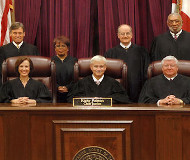Article from: www.thenewspaper.com/news/44/4435.asp
6/13/2014
Florida Supreme Court Strikes Down Unauthorized Red Light Cameras
Red light camera programs set up prior to legislative authorization violated state law, according to the Florida Supreme Court.
 Florida towns jumped the gun when they listened to red light camera companies like American Traffic Solutions (ATS) and installed photo enforcement devices without the sanction of the state legislature. That was the conclusion Thursday of the state Supreme Court which ruled 5 to 2 in a consolidated case that could force cities to pay millions in refunds.
Florida towns jumped the gun when they listened to red light camera companies like American Traffic Solutions (ATS) and installed photo enforcement devices without the sanction of the state legislature. That was the conclusion Thursday of the state Supreme Court which ruled 5 to 2 in a consolidated case that could force cities to pay millions in refunds.
The industry realized that it was in legal trouble and, in 2011, several cities decided to settle lawsuits rather than take their chances in court. That proved to be the right call, as cities like Hallandale Beach and ATS ended up paying only 30 cents on the dollar in refunds. The cities that chose to gamble will now have to pay full refunds.
It was not until July 1, 2010 that the Florida legislature decided to approve the use of red light cameras, but the state's appellate courts split on whether the cities of Aventura and Orlando broke the law by refusing to wait.
Aventura and Orlando insisted that they had home rule authority to enforce traffic laws in their jurisdictions as they saw fit. Florida, like most states, has a statute, 316.007, that requires uniformity of laws covered by the traffic code throughout the state. The court majority saw the red light camera ordinance as inconsistent with the uniformity requirement.
"It is undisputed that the Orlando and Aventura ordinances -- in providing for the punishment of red light violations -- relate to matters 'covered by' chapter 316," Justice Charles T. Canady wrote for the majority. "The ordinances consequently can be sustained as a valid exercise of municipal authority only if they are -- as the express preemption provision of section 316.007 requires -- expressly authorized by statute."
Far from being authorized by statute, Florida's red light camera ordinance set up an entirely different regime for punishing red light violations as civil infractions rather than moving violations.
"The Orlando and Aventura ordinances are invalid because they are expressly preempted by state law," Justice Canady concluded.
Justice Barbara J. Pariente sided with ATS in her dissent that argued the legislature did authorize camera use prior to 2010 through the "powers of local authorities" that granted a generic power of regulating traffic.
The court majority rejected that reasoning, upheld the appellate decision that found Orlando's ticketing illegal (view decision) and quashed the appellate opinion that had upheld Aventura's program (view ruling). A copy of the state Supreme Court's decision is available in a 100k PDF file at the source link below.
Source: Masone v. Aventura (Florida Supreme Court, 6/12/2014)
Permanent Link for this item
Return to Front Page
 Florida towns jumped the gun when they listened to red light camera companies like American Traffic Solutions (ATS) and installed photo enforcement devices without the sanction of the state legislature. That was the conclusion Thursday of the state Supreme Court which ruled 5 to 2 in a consolidated case that could force cities to pay millions in refunds.
Florida towns jumped the gun when they listened to red light camera companies like American Traffic Solutions (ATS) and installed photo enforcement devices without the sanction of the state legislature. That was the conclusion Thursday of the state Supreme Court which ruled 5 to 2 in a consolidated case that could force cities to pay millions in refunds.